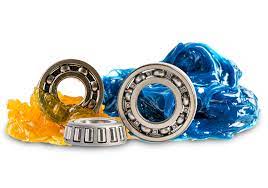
A question often asked is can one use grease containing solid lubricants in wheel bearings?
Heavy duty greases fortified with solid lubricants are commonly used in arduous applications where sliding or reciprocating motion is present. Typical examples are journal bearings, pins and bushes, guides, slides, sleeves and pivots. Solid lubricants prevent wear, scuffing/scoring, binding/sticking, and seizure very effectively in these applications. It is, however, debatable whether grease with solid lubricants is suitable for use in rolling bearings.
Molybdenum disulfide (moly) and graphite are the solid lubricants most commonly utilised in grease formulations. When a grease containing these ‘solids’ is used in high-speed rolling bearings, problems can be experienced with roller “skidding” when the rollers fail to rotate. The sliding of the rolling elements on raceways could lead to the following problems:
Overheating
As the rollers skid along on the raceways, they force the grease out of the way, resulting in metal-to-metal contact between the rollers and the raceways. This in turn generates heat and may well cause overheating of the bearing. Higher temperatures also reduce the hardness of the metal and can cause premature failure.
Flat Spots
When a roller skids, the wear on the roller is concentrated on the area where the roller is in contact with the raceway. As a result, the roller develops flat spots, and its service life is reduced. The raceway also wears, but the wear is spread out over a larger area and is therefore less severe.
Smearing
The removal and transfer of metal from one component of a rolling bearing to another is generally known as smearing. In severe cases of skidding the rise in temperature can be so drastic that it causes a collection of small seizures between bearing components. Surface roughening occurs along with melting and the damage can quickly extend to the whole contact area. Various degrees of smearing can be described as scuffing, scoring or galling.
Greases containing moly are nonetheless recommended for some roller bearings that are subjected to very heavy loads and shock loading, especially bearings in slow or oscillating motion. Typical examples are universal- and CV-joints. If in doubt, consult the equipment/vehicle/bearing manufacturer or your lubricant supplier.
Now back to the opening question Can one use grease containing solid lubricants in wheel bearings? Normally vehicle wheel bearings are adequately lubricated with a lithium based, NLGI 2, multipurpose or EP grease with oil viscosity 200 centistokes +/- 10%. For heavy duty applications a lithium complex grease will provide additional protection. Manufacturers generally do not recommend greases with solid lubricants for wheel bearings in highway applications.
But be warned, even if you are using the correct grease, skidding may occur. Over-greasing can also cause the rollers to skid on the raceways. As they slide forward, they push the grease out of the way, resulting in metal-to-metal contact, temperature increase and accelerated rate of oil bleed. This in turn will cause the grease to harden and hinder lubrication even more – leading to oxidation and bearing failure.
Q8Oils offer you an all-embracing range of greases for an extensive range of application. For more information about our grease portfolio phone 011 462 1829 or email us at info@bcl.co.za. Our lubricant experts are at your disposal and ready to provide you with advice and answer any questions you may have. Alternatively you can visit www.bcl.q8oils.co.za.
